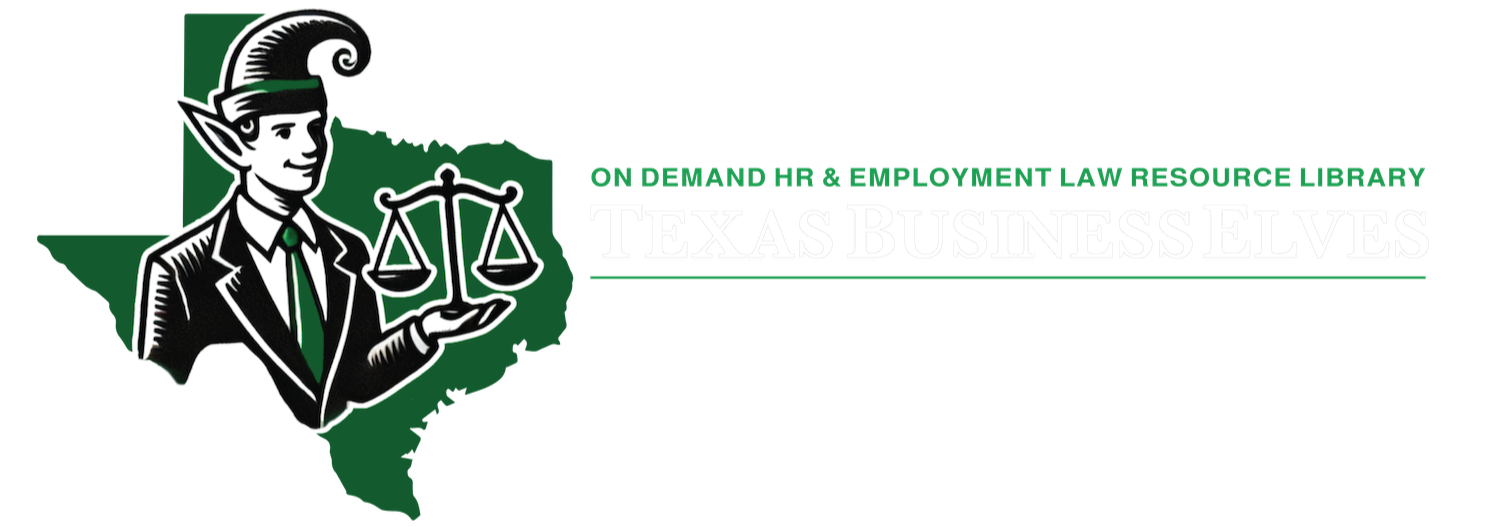
Texas Business ELVES Employment Law Dictionary
A Free Legal Dictionary for Employers, HR Professionals, & Workers
Holiday
A day off from work in observance of a patriotic, religious, historical, or other event. The federal government, state governments, and even some local governments may declare certain days “legal” holidays, during which government offices and many other public institutions (schools, for example) are often closed…
Health Care Reform
More commonly used term for the Patient Protection and Affordable Care Act of 2010 (PPACA), also sometimes referred to as “ObamaCare” since it was signed into law by President Barack Obama, who championed the legislation as a hallmark of his presidency…
Harassment
Offensive and unwelcome conduct - including but not limited to comments, actions, gestures, demands, or visual displays - based on one or more protected characteristic(s) of the victim and that is so severe or pervasive that it affects the terms and conditions of the victim’s employment…
H-1B Visa
Visa issued to foreign nationals seeking to come to the United States temporarily to fill a specific job role for a specific employer. For an H-1B visa, the job must either be considered a “specialty occupation,” involve certain services related to Department of Defense projects, or constitute work as a fashion model of distinguished merit or ability…
Good Cause
Also often referred to as “cause” or “just cause,” this is a legitimate, good-faith, business-related reason for terminating an employee, such as poor performance, egregious misconduct, or a pattern of unexcused absences from work…
Genetic Information Non-Discrimination Act (GINA)
Federal law that took effect in 2008 prohibiting employers from making employment decisions based on a job applicant’s or employee’s genetic information and also requiring employers to keep such genetic information confidential. GINA also prohibits health insurance companies from using genetic information to deny insurance coverage or determine the cost of premiums for coverage…
Gender Identity
The gender with which an individual identifies, as distinguished from the individual’s anatomical gender at birth or even their current anatomical or biological gender. Common gender identities include male, female, transgender, intersex, and non-binary, for example…
Frolic and Detour
Employee conduct that falls outside the course and scope of employment and is undertaken purely for the employee’s own purposes rather than for the benefit of the employer. While an employer is typically liable for the actions of an employee acting within the course and scope of employment under the legal theory of respondeat superior, the employer may or may not be liable for the actions of an employee on a frolic and detour…
Foreseeable Leave
Under the federal Family and Medical Leave Act (FMLA), leave that an employee knows will need to be taken in advance rather than due to some unexpected circumstance or emergency. A medical procedure scheduled a couple of weeks in advance or a planned C-section birth are examples of leave that is likely to be considered foreseeable leave…
Fitness-for-Duty Examination
Medical examination of an existing employee to determine whether the employee is physically or mentally fit to perform the employee’s job. Employers will sometimes require a fitness-for duty examination of an employee who is returning to work following a serious illness or injury…
Final Paycheck
The last paycheck a departing employee receives. Departing employees are legally entitled to be paid all wages they have earned…
Federal Arbitration Act (FAA)
Federal law that details the rules for enforcing private arbitration agreements. The FAA was passed in 1925 to both encourage the use of arbitration as an alternative to litigation and also to require courts to recognize and enforce arbitration agreements as binding contracts…
Faragher-Ellerth Defense
Affirmative defense employers may present when defending against harassment claims brought under federal or (possibly) Texas law. The defense is named for two 1998 United States Supreme Court cases that set the parameters for when an employer may be held liable for harassment of an employee by a supervisor…
Family and Medical Leave Act (FMLA)
Federal law that requires covered employers to allow covered employees to take unpaid leave from work for certain qualifying medical, caregiving, and family needs…
Fair Labor Standards Act (FLSA)
Federal law that serves as the main law governing wages and hours of employment nationally…
Fair Employment Practices (FEP) Laws
Comprehensive term encompassing all state laws that prohibit employment discrimination, harassment, and retaliation. In Texas, Chapter 21 of the Texas Labor Code details the state’s FEP laws and the Texas Workforce Commission (TWC) has authority to investigate claimed violations of those laws and also to enforce those laws…
Fair Credit Reporting Act (FCRA)
Federal law that regulates the collection, use, and content of credit reports and consumer credit information. The FCRA was developed to achieve two main goals…
Exhaustion of Remedies
Sometimes also referred to as exhaustion of administrative remedies, the legal requirement that before filing a lawsuit against an employer an aggrieved individual must first exhaust their available avenues with the appropriate administrative government agency to resolve the dispute…
Exempt Employee
Employee who meets the requirements to be exempt from the overtime rules (and possibly also the minimum wage rules) of the federal Fair Labor Standards Act (FLSA) and any applicable state wage-and-hour laws…





















